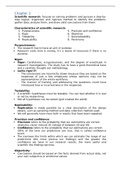Summary
Business Research 1 summary chapter 2, 6, 9, 11, 12, 13, and 14
- Course
- Institution
- Book
The Business Research 1 summary and contains chapter 2, 6, 9, 11, 12, 13, and 14. Used for the (60% counted) exam. This is also helpful for the (40% counted) Business Report you need to write individually.
[Show more]




